Culture
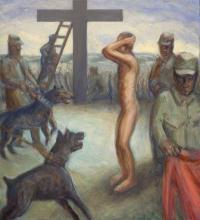
Hemorrhaging from the concertina
crown, brass knuckles, scourging, cigarette burns,
lurching the last meter of Golgotha
where He must dangle three hours in urns
of japing ether, He drops His bloody tree.
Executioners rip His clothes away,
cut cards for His keepsake convict jersey.

People often say the mark of a true “master of a craft” is one who makes something ridiculously difficult look easy. Chris Thile, former member of Nickel Creek and front man for folk group Punch Brothers, is one of those people. As my buddy standing next to me at last night’s Punch Brothers show in Washington, D.C. said, “It’s like he’s an extension of the mandolin. He can do anything he wants with that thing.” I mean, the guy can almost flawlessly whoop out some Bach on the mandolin.
While musicianship is certainly present on their recorded material, the talent of each member of the five-piece band is fully realized during their live shows, which are more like jam sessions. With the encore, they ended up playing for almost two hours to a sold out crowd at the 9:30 Club.
It almost got to the point where I didn’t believe they were real. They almost seemed like robots.
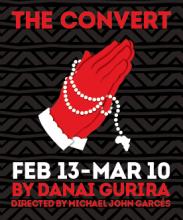
Next week, The Woolly Mammoth Theatre Company will premiere The Convert, a play by Off-Broadway Theater Awards-winning playwright, Danai Gurira.
The Convert is set in late 19th Century Southern Africa (modern-day Zimbabwe). The play follows Jekesai, “a young girl who escapes village life and a forced marriage arrangement, ultimately discovering Christianity under the guidance of an African teacher. However, as anti-colonial sentiments rise to a boiling point, Jekesai must choose between her new European God and the spirits of her ancestors. … The Convert examines complex cultural and religious collisions that shaped the post-colonial world, the reverberations of which are still felt in Zimbabwe today.”
I had the opportunity to talk to actress Dawn Ursula, who plays Prudence in The Convert. She was also named one of DC’s top 12 actors / actresses by the Washington Post.

Among my must reads are the Sunday New York Times Book Review and other book reviews I come across in various media outlets. There are too many books being published that I would love to read, but just don’t have the time. So, I rely on reading book reviews as one way of keeping in touch with what’s being written. Here are my picks from this week’s books.

"Can we watch a video with that guy who has the weird hair and the dark rimmed glasses?" -Member of My Youth Group
"Love wins the in the sense that God’s will is the reconciliation of all things—the soul, the body, the earth, the cosmos, and everything in it." -James Wellman, Rob Bell and a New American Christianity, 59.
American Christianity is experiencing a theological shift. Many have tried to explain it, sometimes making the shift far more confusing than it actually is. Fortunately, the shift can be explained quite simply, and while it may be new to American Christianity, it is actually very old. Indeed, it dates back 2,000 years. The shift boils down to the two theological axioms of the New Testament, both found in the letter 1 John:
“God is light and in him there is no darkness at all” (1:5) and “God is love” (4:8 and 16).
Those statements, while simple, are far from simplistic. John was bold in affirming these statements. He knew he had to give it to us straight – probably because he and the other disciples had a hard time understanding what Jesus meant in his teachings and parables. So, John cut to the chase and simply claimed that Jesus reveals, “God is love and God is light. There is absolutely no darkness within God.”
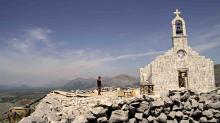
PARK CITY, Utah — It’s been said that Hollywood films comfort the afflicted while Sundance films afflict the comfortable. Film offers a vicarious entry to the world the way it is, and the films I saw at the 2013 Sundance Film Festival left me longing for a different world — the world the way it ought to be.
It ought to be a world in which Muslims and Christians love, serve, protect, and forgive each other. Circles is based on a 1993 incident that took place in Trebinje, a small town in the Serbian region of east Herzegovina. Three Serb soldiers were brutally beating Alen Glavovic, a Muslim shopkeeper. When Srdjan Aleksic, a Christian Serb intervened to stop the soldiers, they turned their attention on him and beat him to death. The film explores the impact of this incident on the Muslim who survived the beating, Srdjan’s fiance and his father, on the children of the perpetrators, and on the whole village.

Among my must reads are the Sunday New York Times Book Review and other book reviews I come across in various media outlets. There are too many books being published that I would love to read, but just don’t have the time. So, I rely on reading book reviews as one way of keeping in touch with what’s being written. Here are my picks from this week’s books.
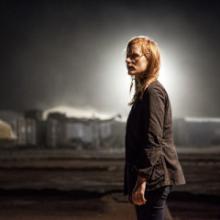
Nothing was tortured more in the making of Kathryn Bigelow’s film Zero Dark Thirty than the truth about torture.
While it’s just a movie, it runs the risk of becoming the basis for a false view of reality for millions of moviegoers who have largely ignored a decade of debate about the efficacy of the United States sanctioning torture.
To dismiss the movie as simple entertainment ignores the impact seeing it has on our perception of reality, even when we understand we are watching actors in a — mostly — pretend setting.
The fact that Zero Dark Thirty was nominated this week for an Academy Award for Best Picture only underscores the importance of understanding what it gets wrong about torture.
PASSINGS, 2012
I always begin a new year by remembering those who passed in the just concluded year. These aren’t necessarily the most famous, and I didn’t know them personally (or, at best, had met several briefly), but their lives touched mine in three of my passions.

Almost two years ago, I took a titanic risk. If you look at things from an earthbound perspective, what I did is: I took my livelihood, and my children's provision, in my hands alone. I quit my job at The News & Observer, a major, Pulitzer-prize-winning newspaper where I earned a decent salary and reached 150,000 to 200,000 readers on any given day.
The decision was a long time coming — my whole adult life, really. Before I ever started my first newspaper job in 2000, I’d wanted to help people explore deeper things than just tax policy, or crime, or environmental regulation. These just skim the surface of who we are as humans: why we share or hoard, why we hurt or protect one another, what we owe to Mother Earth.
What I found as a newspaper reporter was that I had no choice but to skim the surface of things. There’s not enough space to go deeper, but, more importantly, deeper takes you into hypothesis, not fact — and hypothesis is a leap of faith. What you find when you go deeper depends a lot on the gear you’re wearing when you dive. I’m cloaked in Bible stories and Christian tradition, and therefore I live in hope that there’s a Creator and that this God is working quietly to heal the world.
I read recently in Psalm 27:
“The Lord is my light and my salvation —
whom shall I fear?
The Lord is the stronghold of my life —
of whom shall I be afraid?”
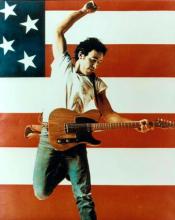
IT WAS THE first week of November 2012, and Bruce Springsteen was busy helping nail down a few swing states for President Obama. In the process, he expressed more enthusiasm than I could ever muster for the man who put Tim "The Fox" Geithner in charge of our financial hen house. But political quibbles aside, I remain convinced that what Springsteen actually does for a living is more important to the life of our country than the work of any living politician, and I saw living proof that very same week.
On the Saturday night before Election Day, Springsteen and his E Street Band dropped into Louisville, Ky. Of course, my wife, Polly, and I had to go, and we had to take our 12-year-old son, Joseph, who has become the fourth Springsteen-obsessed member of our family. It was my fifth time to see the show, and ever since I've been thinking of the poem in which Allen Ginsberg asked America, "When will you be worthy of your million Trotskyites?" Paraphrasing Ginsberg, I ask today, "America, when will you be worthy of your E Street Band?"
To me, going to see the E Street Band has become something like going to see a natural wonder, like Yellowstone or Mammoth Cave or, more to the point, the California redwood forests: Like the redwoods, it's growing older. The bark gets rougher by the decade, and some branches break off and fall to the earth. But Springsteen's great tree of American music is still growing in stature and substance. The band has become a cultural institution that spans races, genders, and generations and fittingly represents the sacred American musical tradition that has grown from the work songs, ring shouts, and spirituals of the slaves.
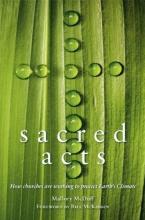
IN THE FOREWORD to Sacred Acts: How Churches Are Working to Protect Earth's Climate, prolific scholar-activist Bill McKibben recalls a time not long ago when many people of faith regarded environmentalism suspiciously—conservatives saw it as a cover for possible paganism, while liberals considered it less of a priority than problems such as war and poverty. Now, however, theologians and religious leaders discuss the environment almost as much as ecologists and Nobel prize-winning scientists do. As this book shows, moreover, the environmental movement now includes religious organizations such as Earth Ministry, Interfaith Power & Light, and GreenFaith, which are working at the grassroots level in congregations and communities.
Edited by Mallory McDuff, a lay Episcopalian who teaches environmental education at Warren Wilson College near Ashville, N.C., Sacred Acts boldly focuses on climate change. McDuff believes that momentum is building among Christian communities worldwide as they call for just climate solutions—much like a modern Pentecost moment. The book addresses both skeptics and those who know climate change is real but feel overwhelmed by the problem's magnitude and despair of finding and implementing solutions.
The contributors to Sacred Acts include clergy, teachers, activists, directors of nonprofit organizations, and a farmer. Its 12 chapters are divided into four sections on the themes and strategies of stewardship, spirituality, advocacy, and justice.

IN THE TITLE song of Aimee Wilson's new album, Unto Us the Sun, the music begins soft and gentle, like a slight shaft of light breaking over the morning horizon. Gradually the song intensifies, both instrumentally and vocally, until it reaches an almost ecstatic crescendo—a musical embodiment of the process she lyrically portrays of the subtleties of nature opening up its unspeakable beauty, a grand chorus of creation praising its Creator. It is also hardly incidental that the song evokes biblical language of resurrection, while both the title and images such as "tender as the shoot" subtly hint at the presence of Christ—not a heavy-handed doctrinal Christ, but the saving incarnation of a loving God.
Wilson is part of a remarkable network of young, spiritually rooted musicians (such as the Psalters) who are fashioning a very new and dynamic musical language of radical faith—a faith that is searching, exploring the edges of experience, probing human hurts and joys as well as divine mysteries and manifestations. Wilson's personal journey has taken her from the hills of her native Tennessee to inner-city Philadelphia. Her songs cover a range of moods, many reflecting her mystical apprehension of God's presence in creation. Other songs, drawing on her experience working with women who have struggled with homelessness and mental illness, convey the power of grace amid human brokenness.
IT WAS AS if the poison of the rancorous 2012 campaign had seeped into our social groundwater, tainting family gatherings, Facebook feeds, church coffee hours, and workplace lunch rooms. In my lowest moments I pictured an election-result map rendered with myriad fractures, like windshield glass—a nation of particles and fragments, held together, barely, by begrudging surface tension.
How do those of good will find productive and respectful ways to talk about important civic and moral issues when a significant number of people view their fellow citizens as enemies?
Two recent books, by radically different authors, explore how to stay committed to your principles while reaching out and even finding common cause with those who live and believe differently.
ReFocus: Living a Life that Reflects God's Heart, is by Jim Daly, president since 2005 of Focus on the Family. Faitheist: How an Atheist Found Common Ground with the Religious is by Chris Stedman, the assistant Humanist chaplain at Harvard University and an activist in atheist-interfaith engagement. Daly leads a conservative evangelical institution that has been a major player on the Right in the culture wars of the past three decades (including around what Focus would term the "homosexual lifestyle"). Stedman is a young gay atheist who was once attacked by thugs who shouted Bible verses as they tried to shove him and a friend in front of an oncoming train. And yet both men argue, from both pragmatic and ethical grounds, for actively and respectfully engaging those who hold different beliefs.
THE BEST experiences I had at the cinema last year were nostalgic—re-releases of The Life and Death of Colonel Blimp and Lawrence of Arabia were uncanny reflections on the cost of war to soldiers and some roots of contemporary Middle East strife. Here's my list of the best films released in 2012:
10. A tie:The Pirates! Band of Misfits, a gloriously rich, smart comedy for all ages, full of life and self-deprecating humor, and Life of Pi, which envelopes its audience with visual wonders and spiritual questions.
9. Wes Anderson's delightful treatment of childhood first love amid dysfunctional adults, and a film not afraid of the shadow side of growing up, Moonrise Kingdom.
8. The Cabin in the Woods, a gruesome horror comedy that not only enacts and portrays, but understands the lie of redemptive violence.
Fresh Vintage
Cody ChesnuTT's Landing on a Hundred is a classic soul album, from the infectious grooves and vocals to recurrent themes of personal and social redemption (comparisons include Marvin Gaye and Curtis Mayfield). Vibration Vineyard
Reclaimed Voices
A team of actors, playwrights, and activists help Ugandan teens, many of them survivors of abduction by the Lord's Resistance Army, courageously share their stories with their community—and, through the documentary After Kony: Staging Hope, with the world. First Run Feature

IT'S A STORY that promises to make you believe in God.
A boy, shipwrecked on a lifeboat with a Bengal tiger, repeatedly cheats death and eventually discovers his own self. It's a typical coming-of-age tale, really—except for the whole tiger part.
Life of Pi centers on Pi Patel, the son of a zookeeper, who grows up grasping to understand God. His open heart and willingness to learn lead him from Hinduism to Christianity to Islam. While stranded at sea along with a few escaped zoo animals as company, he continues to explore the meaning of God as he's thrust into dramatic—and at times inconceivable—situations.
Anyone who has read Yann Martel's best-selling book can understand how near impossible it seems to adapt the larger-than-life story into a film—none more so than the person who did just that, screenwriter David Magee. The largest chunk of Pi's journey is a solitary one, save the aforementioned Bengal tiger (named Richard Parker).
In an interview with Sojourners, Magee said he wrote the scenes without any lines for Pi at all, only inserting them where necessary after the fact.

Deep with one savior’s death, how many more?
In observance of which, the Dresden burghers
as usual held Shrove Tuesday circuses
around Our Lady’s Church, the Frauenkirche,
eating pancakes before their fast for Easter.

I know this sounds totally bizarre, but I had a moment of clarity about the value of human life in, of all places, a kid-themed pizza joint yesterday. No, they don’t exploit their workers (that I know of, short of submitting them to overstimulated kids all day). It took a few steps for me to get there, so bear with me.
Yesterday, my daughter, Zoe, turned four years old. It’s a crappy time of year to have a birthday party, since lots of people are out of town, and those who are around are more or less partied out from the holidays. On top of that, we just moved here a few months ago and hardly know anyone. So to try and make up for all of that, we let her pick anywhere she wanted to go for dinner.
Not surprisingly, she picked John’s Incredible Pizza Company, which is like Chuck E. Cheese on steroids. Not high on my list of choices, but hey, it wasn’t my birthday. Zoe’s grandparents are in town and they invited a couple other family members who live nearby to join us. One of Amy’s distant cousins brought along her husband or boyfriend (still not sure which), and I remarked after the dinner to amy that he bore a striking resemblance to the alt-rock front man Perry Ferrell, of Jane’s Addiction fame.
“What ever happened to Perry?” Amy asked. Short of founding the Lollapalooza Festival and hitting every Coachella festival ever held, I had nothing. So I Googled him.

This week’s episode was recorded in the youth group room at First Christian Church in downtown Portland, Ore. To start things off, Jordan talks about being the Marv Marinovich of comedy by relentlessly pushing his daughter to be funnier while Christian embraces the black magic that is naturopathic medicine.
This week’s guest is Wm. Paul Young, author of the wildly popular novel The Shack, which has sold 18 million copies to date. Paul talks about the creative process, about trusting God rather than trying to please, and the development of his latest book, Crossroads. Basically, it’s just an interesting conversation with a fascinating person who’s also incredibly gracious and humble.